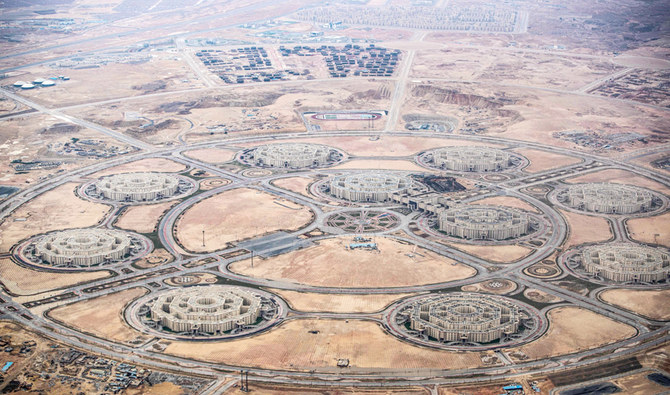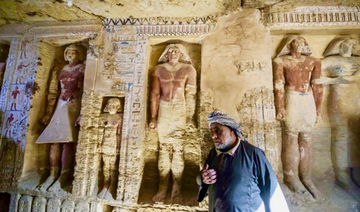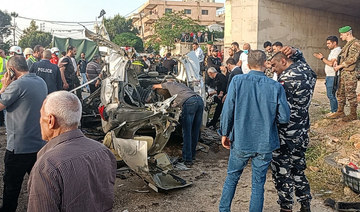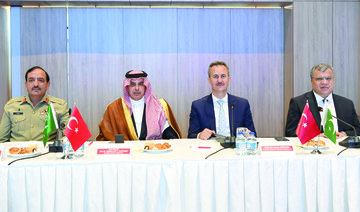LONDON: Deprived of adequate access to water, sanitation, and hygiene services, Palestinian women and girls in Gaza are bearing the brunt of the prolonged and deepening humanitarian emergency caused Israel’s ongoing military offensive.
With no resolution to the conflict between Israel and Hamas in sight, more than a million displaced women and girls in the embattled Palestinian enclave continue to endure daily challenges in increasingly dire conditions.
UN Women has described the Israeli military operation in Gaza, which began in the wake of the Oct. 7 Hamas-led attack on southern Israel, as a “war on women,” with at least 10,000 killed since the start of the conflict — among them more than 6,000 mothers.
Those figures, published in April, are now likely far higher as Israel expands its operation and bombing raids into eastern Rafah — Gaza’s southernmost city, now home to some 1.4 million displaced Palestinians.

According to UN figures, this latest operation has forced an estimated 150,000 Palestinians to flee central and northern Rafah.
While the biggest risk to women and girls in Gaza is injury or death under Israeli bombardment, “the unhygienic conditions and lack of water in Gaza are also having a very negative impact on women and girls’ health and dignity,” Fikr Shalltoot, the Gaza programs director at Medical Aid for Palestinians, told Arab News.
Israel denies deliberately targeting civilian infrastructure, accusing Hamas of using residential areas for cover.
As summer approaches, soaring temperatures worsen the spread of communicable diseases caused by a lack of hygiene facilities, water, and access to proper food. The heat itself is also a significant danger to children and the elderly.
“During a recent heatwave, a 5-year-old girl tragically died in her tent due to extreme heat,” Shalltoot said.
Analysis of satellite imagery by BBC Verify found that the Israeli operation in Gaza has damaged or destroyed more than half (53 percent) of the territory’s vital water and sanitation facilities.
The analysis, based on images acquired in March and April, also confirmed that four of the six wastewater treatment plants in Gaza have been damaged or destroyed. These facilities were critical to preventing sewage buildup.
Fidaa Al-Araj, Oxfam’s food security, cash, and protection coordinator in Gaza, said the water, sanitation, and hygiene situation facing women and girls in the enclave was “challenging,” leaving them unable to access clean toilets or private shower spaces.
“Having been displaced into camps or even in a host community, the numbers of people, of internally displaced persons, are very, very high,” Al-Araj told Arab News. “So, there is (overcrowding), there are many difficulties in having access to toilets, bathrooms, showers.”
She added: “Even if you have the facilities, and even if by any stretch they are enough for the IDPs residing in any given space, there is the issue of lack of running water to supply those facilities and to have them up and running all the time.
“So, the hygiene conditions are very compromised, to say the least. When it comes to women and girls, there are issues of privacy, which is completely lacking.”
Where washrooms are present, people have “to wait in line with all sorts of people, even strangers, men and women, just to use the toilet. You have people banging on the door of the toilet while you’re in there, asking you to hurry up because the line is still very long.”
INNUMBERS
• 700,000 Women and girls now hosted in Rafah who have nowhere else to go.
• 93% Women surveyed who feel unsafe in their own homes or in displacement.
• 6/10 Women who reported complications in pregnancy since Oct. 7.
Source: UN Women
This also makes management of menstruation especially challenging, as women and girls “endure longer hours without changing a pad, without washing,” Al-Araj added.
According to UN figures, there are more than 690,000 menstruating women and adolescent girls in the Gaza Strip. But aid agencies, which have had very limited access to the enclave due to the Israeli blockade, have been unable to meet the high demand for hygiene kits.
And since Israel took control of the Palestinian side of the Rafah border crossing on May 7 and closed the nearby Kerem Shalom crossing, the already limited flow of commercial goods and humanitarian aid has been further strangulated.
MAP’s Shalltoot confirmed that women’s sanitary products were “scarce in the local market,” highlighting that this has had “a psychological and physical health impact on women and girls.”
She said: “They resort to homemade, makeshift alternatives, which negatively impact their health by putting them at risk of reproductive and urinary tract infections and protection-related risks.
“This also negatively impacts their psychological well-being, anxiety and insecurity.”
Even the simple act of taking a shower has been almost impossible for women in Gaza for several months.
“It’s very difficult to find a spot designated to take showers, and if it’s there, it’s very difficult to have water,” Oxfam’s Al-Araj said. “And if the water is there, it’s very difficult to find time to take an adequate shower.”
She added: “As a woman and as a mother of girls, I’ve been through all of this. To overcome these circumstances, you space out the shower times, so you take a shower when it’s absolutely needed.
“Sometimes you could spend a couple of weeks or even more without taking a shower.”
The aid agency Medecins Sans Frontieres told the BBC that the destruction of water, sanitation and hygiene facilities has led to “disastrous health consequences for the population,” notably a significant rise in gastric complaints in Rafah.
Contaminated water has also led to a spike in hepatitis A cases, with women and girls facing a heightened risk of exposure to the disease due to their traditional domestic responsibilities and caring for the sick, according to UN Women’s April gender alert report.
The report, titled “Scarcity and Fear,” highlighted that the lack of adequate and dignified facilities also exposes women and girls to reproductive and urinary tract infections.
“This situation could develop into dangerous or concerning health conditions for the women and girls, and I’m really sorry to say that it’s not given priority,” said Al-Araj.
“The heightening demand on the time, resources, and capacity of the medical facilities and staff makes prioritizing women’s issues or girls’ issues very difficult.”
Moreover, there are no quick fixes. Even if sufficient aid is permitted to enter Gaza, facilities need to be carefully planned in order to meet the necessary standards of privacy, cleanliness, and safety.
“It’s not enough to build a shower or a toilet,” said Al-Araj. “It’s not enough to provide it with water and that’s it. You have to think of the site … Is it safe for women and girls, is it accessible at all times … is it targeted maybe by different threats?
“You also have to think about the supplies. You don’t give a hygiene kit or a dignity kit once, for example, and that’s it, your work is done. You need to regularly provide those kinds of kits.”
Al-Araj also emphasized the need for “complementary services,” including extending responses “to enhancing access to sexual and reproductive health care system.
“I can only wish that the aftereffects of all of this wouldn’t linger for long or have irreversible results.”






























